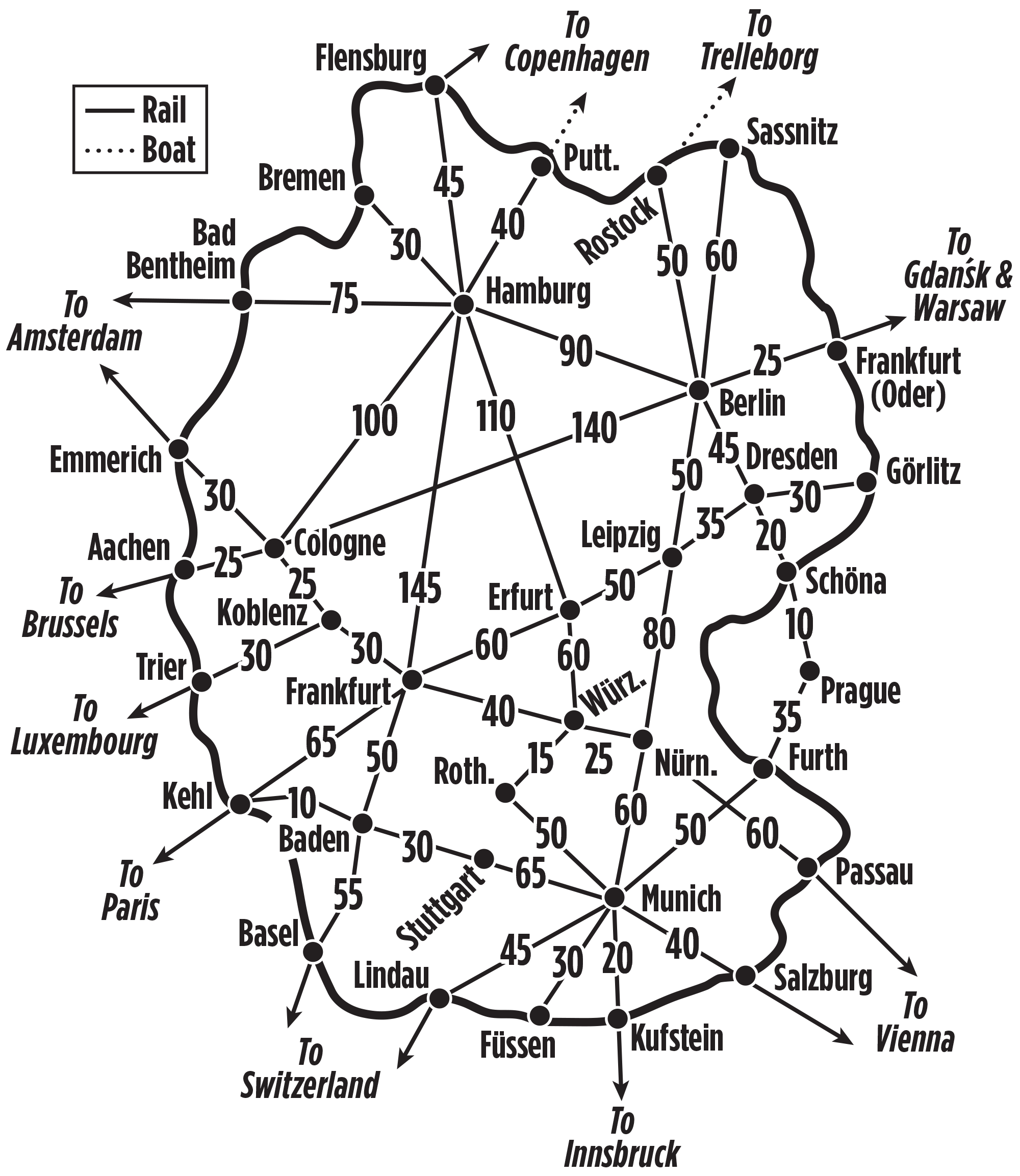Germany Rail Passes and Train Tips
By Rick StevesAre rail passes a good value for Germany?
Rail passes are usually a great value in Germany, often saving money while allowing you to hop trains at your convenience. While it's possible to swing many point-to-point ticket discounts in Germany, a rail pass still makes sense for most visitors traveling by train in Germany.
How do I see whether a rail pass makes sense for my trip in particular?
Train Fares: Germany

Use this map to add up approximate pay-as-you-go fares for your itinerary, and compare that cost to the price of a rail pass for the number of days you expect to spend on the train. Also, follow the links below for:
• More tips for figuring out whether a pass makes sense for your trip
• The basics on choosing among rail passes
• More tips on how to save money by fine-tuning your rail pass
• Advice on deciding between first and second class
• Fare-estimate maps outside Germany
• Answers to frequently asked rail-pass questions
What are my options for rail passes that cover Germany?
→ see "extra tip" below
→ see "extra tip" below
(33 countries) → read more about this pass
►Rail Europe shopping cart: Have an order underway? Review and complete it here.
Extra tip: For anyone traveling with at least one other person, the best option for a rail pass covering just Germany is to hold off on buying your pass in advance, then get a non-Eurail German Rail Pass in person upon arrival, as this allows you to take advantage of its "twin" discount (see this pass's key details below). The Eurail and non-Eurail versions of the pass are priced the same for solo travelers.
Do I need to make seat reservations on German trains?
For the most part, you can hop on most German trains with just your rail pass in hand. Most daytime routes, including fast InterCityExpress trains, do not require seat reservations. Some international or overnight routes (such as to Paris, Brussels, Venice, or Copenhagen) do require that you have reservations before boarding, as indicated in online train schedules. The EuroCity train between Munich and Italy (via Innsbruck) requires passholders to make a reservation, though this isn't indicated in online schedules.
What do rail passes cover in Germany?
German rail passes cover virtually all trains within Germany, as well as the following extras:
- Trains between Munich and Salzburg (as Salzburg is officially the Austrian border station on this route)
- S-Bahn trains (but not U-Bahn trains; this bonus is usually only relevant on the days you arrive or depart on a longer train ride, since otherwise it makes little sense to use up a rail pass travel day for a short, inexpensive trip; the same is true for Eurail Global passes)
-
International routes: certain trains to/from Germany operated by the Deutsche Bahn — meaning you can avoid buying separate tickets (or bumping up to a Global Pass) if these are your only trips beyond Germany. These routes include:
- Belgium: ICE international trains to/from Brussels and Liège (but not Thalys trains)
- Austria: EuroCity trains to/from Innsbruck via Kufstein
- Italy: EuroCity trains to/from Bolzano, Verona, Bologna, or Venice (but Germany-only passes don't cover the full cost of night trains or routes via Villach); reserve seats either in train stations or via the Deutsche Bahn's site — choose "Seat only (no ticket)"
- Other bonuses (including a few ferry discounts) are described on the page linked from "Buy a Germany Eurail Pass" above.
The rare exceptions: No rail pass covers routes operated by FlixTrain, nor the European Sleeper overnight train between Berlin and Amsterdam/Rotterdam/Antwerp/Brussels.
Any tips for buying point-to-point train tickets in Germany?
If a rail pass doesn't pencil out for your trip, you may be able to shave off the cost of your train tickets with some of these tips:
- Up to four kids under 15 travel free when named on one train ticket with anyone age 15 or older. (And kids under 6 ride free without a ticket — whereas train travel in most neighboring countries is free only for kids under 4.)
- With "saver fare" (a.k.a. "Sparpreis") discounts, you save 25–50 percent — sometimes even up to 70 percent — by buying a train ticket for pre-selected dates and times (group discount available, refund restrictions apply, and seats at each discounted rate are limited — for best prices buy as early as possible; deals go on sale up to a year ahead…but you don't have to book that early for good discounts).
- Two slow-train deals can be a steal: The "day ticket for Germany" gives groups of up to five people unlimited second-class travel on non-express trains (not ICE, IC, or EC trains) for a calendar day (€49 for one traveler, €10 for each cotraveler, can't be used before 9:00 a.m. on weekdays, called the "Quer-durchs-Land Ticket" in German materials). Regional day tickets (a.k.a. "Länder-Tickets") are a similar deal for local trains within a single region, such as Bavaria (generally €22–32 for first person, €3–10 each for up to four cotravelers, can't be used before 9:00 a.m. on weekdays).
- The DB Navigator app makes it easy to check schedules and buy tickets on the go. Just as on the Deutsche Bahn's website, discounts are calculated if you add children or put in a return date. You can also order by phone at +49 1805 99 66 33.
- Those staying longer in Germany can get discounts for a full year by purchasing one of several Bahn Cards.
Also see our general tips for buying point-to-point tickets.

